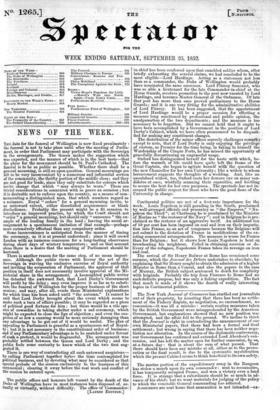NEWS OF THE WEEK.
THE date for the funeral of Wellington is now fixed proximately : the funeral is not to take place until after the meeting of Parlia- ment, in order that Parliament may participate with the Sovereign in the arrangements. The Queen makes the suggestion which was expected, and the manner of which is in the best taste—that the place for the monument should be St. Paul's Cathedral. The funeral is to be as .public as possible. Whether there shall be a general mourning, is still an open question. General mountings are felt to be very inconvenient by a numerous and influential section of the community, the thrifty portion of the middle class ; and they are not good for trade, since they only substitute for colours which invite change that which " may always be worn." These are trivial considerations in connexion with so grave an occasion ; but it is desirable not to enforce upon the country, as a means of com- memorating a distinguished man, that which numbers regard as a nuisance. Royal " orders " for a general mourning invite, to an untoward extent, either dissatisfied acquiescence or blank disobedience. Probably the present might be a fit occasion to introduce an improved practice, by which the Court should not "order " a general mourning, but should only " announce " the ex- ample of the leading family in the land ; leaving the social ar- rangement to a spontaneous imitation of that example—perhaps more extensively effectual than any compulsory order.
Some inconvenience is anticipated from the manner of timing the ceremony, as it is at present understood ; since it will crowd London with an immense concourse for a long-lasting observance daring short days of wintery temperature ; and on that account alone there is a desire that the meeting of Parliament should be hastened.
There is another reason for the same step, of no mean import. ance. Although the public views with favour the act of the Sovereign in waiving the exclusive exercise of Royal authority and inviting the cooperation of Parliament, the approval of that position in itself does not necessarily involve approval of the Mi- nisterial share in the arrangement. A keensighted public writer has detected the awkward fact, that Lord Derby's Government will profit by the delay ; may even improve it so far as to substi- tute the funeral of Wellington for the proper business of the short session; and may, after all, evade those Ministerial explanations for which time has been asked until "the autumn." It cannot be said that Lord Derby brought about the event which seems to make such a- turn of affairs possible ' • it may be regarded as a piece of political good fortune for him : but there would be a vile spe- cies of cowardice in taking shelter under a sad ceremony, which might be expected to close the lips of objection ; and even the sus- picion of so low a cunning would be more seriously damaging than any advantage to be got out of it would be useful. The plan of appealing to Parliament is graceful as a spontaneous act of Royal- ty; but it is not necessary in the constitutional order of business ; and if any Parliamentary advantage is to be snatched under favour of such a pretext, it would be disgraceful. The arrangement was probably settled between the Queen and Lord Derby ; and the public feels some curiosity to know which of the two first sug- gested it.
There is one way of contradicting all such untoward suspicions— by calling Parliament together before the time contemplated for political business, and by devoting what may be considered as that special prelude of the session exclusively to the business of this ceremonial ; clearing it away before the real work and conflict of the session be entered upon.


























